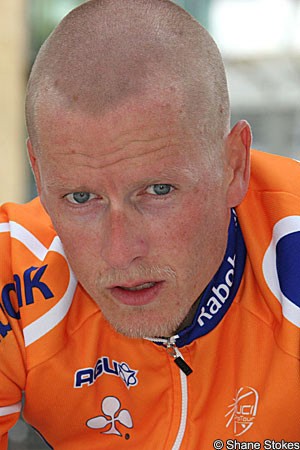Maassen confirms that UCI contacted Rabobank to speak to team doctor Leinders during race
 Former Rabobank team manager Frans Maassen has provided partial confirmation of Michael Rasmussen’s claim this week that the UCI had known about suspect blood values during the 2005 Tour de France, saying that the Rabobank team was indeed contacted during the race.
Former Rabobank team manager Frans Maassen has provided partial confirmation of Michael Rasmussen’s claim this week that the UCI had known about suspect blood values during the 2005 Tour de France, saying that the Rabobank team was indeed contacted during the race.
Rasmussen has written an expose book called Yellow Fever, making a range of claims. These include a statement that 2012 Giro d’Italia winner Ryder Hesjedal plus two other Canadians were coached by him in how to use banned substances in 2003, an allegation which led to Hesjedal admitting previous doping use.
He also made doping claims against Rolf Sorensen, Frank Høj and Nicki Sørensen, and said that Bjarne Riis turned a blind eye to a cortisone injection taken by him in 2002.
However one of the most serious of his allegations was that that the UCI had not acted in 2005 when he had clear signs of doping during that year’s Tour. He writes that his value of immature red blood cells [reticulocytes] was just 0.23, under the minimum threshold of 0.3. However he stated that after team doctor Gert Leinders med with the UCI’s doctor Mario Zorzoli, that the governing body let him continue in the race.
He suggested that the team was such a big sponsor of the sport that the UCI essentially turned a blind eye to his drug use.
Contacted by Volkskrant, Maassen confirms Rasmussen’s account that the UCI had contacted him first. “They [the UCI] were looking for Leinders, but did not have his number,” said Maassen. However he claimed not to know anything about an agreement made between Leinders and the UCI.
BT contacted Zorzoli to ask him his account of the moment. He sent a SMS message back stating that he was not able to speak.
However UCI press officer Louis Chenaille has disputed Rasmussen’s assertion that a reticulocyte level under 0.3 should have led to his suspension. “We can only say that in relation to the rules that were in force at the time, the limit of reticulocyte value for riders not to start was 0.2 percent.”
BT has examined the UCI rules from that era and confirmed that a value of 0.2 was indeed in place. However the question remains why the UCI contacted the team; was it a warning that he was close to the point where he would have been thrown out of the Tour, or did his values cross a different threshold?
The answer to that is crucial. If Rasmussen was near a borderline but didn’t actually cross it, it puts the UCI under less pressure than if he had been over or under set limits. Anti Doping Denmark is thought to be looking into the matter plus the other allegations made by Rasmussen in his book.